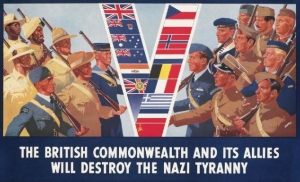
Apparently there’s this thing whereby people with privileged social positions—say, white people in a racist society, men in a sexist society, or straight people in a heterosexist society—choose to identify themselves as “allies” (i.e., of those who are disadvantaged or harmed by the social institution in question). Indeed, there are how-to guides for this sort of thing. And, hey, who could object to someone who wants to ally themselves with people who are subject to oppression? Well, there are a few reasons to at least be wary here. But first, I think it is important to make the following point:
If you have to tell someone that you are their ally, it is utterly unlikely that you are actually acting like their ally.
If (potential) allies read no further but take this to heart, I’ll be reasonably pleased.
A rhetorical question
Let’s begin with the “rhetoric” of allyhood. Alliances are, by and large, made intentionally, voluntarily,and pragmatically. Alliances usually have beginnings, and they frequently have endings. The obligations that arise within them arise because of the act of aligning. While we might think of the end of alliances as sometimes involving a kind of betrayal, it seems to me that there is also something about the nature of alliances that they are ephemeral. Consider the model of political alliances. During World War II, the Soviet Union allied with the US and UK to defeat Nazi Germany,1 and then that alliance ended, bringing about Cold War. The alliance was undertaken with a particular purpose in mind, and when that purpose came to fruition, the alliance gave way.
Suppose that is broadly how alliances work. Is this an apt analogy for how we—committed anti-sexist, anti-racist, anti-heterosexist, anti-classist, etc. people—want people with privilege to understand their obligations? The rhetoric of allyhood seems to have built into it a model of obligation that comes about only in light of having aligned oneself with a political cause. But this seems just wrong. What we want is for people to understand that there is something fundamentally immoral about a certain kind of social order, and that, as a result, people with privilege have an obligation to bring about changes to that order. That is, men do not have obligations to undermine sexist institutions solely in virtue of having a commitment to feminism; if the feminist critique is correct, men have this obligation full stop. But, at best, the rhetoric of allyhood obscures this obligation—and, at worst, erases it. The categorization of oneself as an ally brings with it the idea that what one is doing can be undone at will.
Beyond rhetoric
Beyond the rhetorical dangers—and, really, miscategorization—of allyhood, we ought to worry about how understanding people’s role as allies can serve to reflect and reinforce their privileged position vis-a-vis those they ally with. A genuine risk that arises from the rhetorical concern is that allyhood can give rise to a kind of dilettantism: being an ally is something to do for now, but one can always leave when the project gets less interesting or when one feels slighted or criticized by the engagement style of the members of a movement. Identifying oneself as an ally brings with it identifying the struggle as belonging to someone else, and so something that one can leave. An ally who walks away from a political struggle is walking back into the full embrace of privilege, and so has little to lose and much to gain from doing so.
There is an important sense in which the struggle is not the ally’s, and I don’t want to downplay that point. In particular, it is important to mark the differences in what is at stake for whom in any struggle and to avoid appropriating the struggles of others as one’s own. Allies that try to take ownership of a struggle in this fashion end up reinforcing the structures that they seek to undermine by centering conversations on their needs and perspectives, attempting to take leadership, and generally not recognizing that what is mostly—or all—theory for allies is the lived experience of the people they wish to ally with. Nonetheless, the larger point I want to make is that there seems to me to be something in the self-identification as an ally that reinforces the deleterious sense in which the struggle is the ally’s only for as long as the ally wants—rather than the obligation that arises from being a moral agent. The challenge, then, is for allies to understand the moral obligation to fight against these institutions as their own while simultaneously understanding (pace everything their privilege indicates) that other people’s knowledge, skills, and experience come first.
Excuses, excuses
Another concern is that “allies” use their identity as “allies” to rationalize and excuse bad behavior. This takes a few forms, one of the most pernicious is the “I’m an ally, so I mean well” line of thought. That is, person X does something that reinforces the institutionalized oppression of the group that X is an “ally” for, and then replies with references to being an ally when called to the mat. While, in general, intentions don’t make actions right or wrong (though they make a difference to our evaluation of moral agents), what is particularly troubling about this response is that presumably people become “allies” because they recognize the institutional nature of the problem. In these cases, “allies” talk “institutions, not intentions, make oppression” out of one side of their mouth and “my intentions are good, so I’m good” out of the other. Alas, identifying as an “ally” isn’t a magical incantation that absolves one of the blameworthiness for complicity or participation in immoral institutions, and it does not undo harm.
The existential threat of allies
This brings me to my final, one point that allies frequently miss about themselves: they represent—and perhaps are—an existential threat to the people they seek to ally with. To see what I mean here, consider what I’ve said so far. No matter how well-meaning they might be, allies are people who:
- benefit from institutionalized system of oppression;
- are likely unaware of the extent of that privilege, the nature of harms that privilege creates, and the frequency and manner that the harms occur;
- have incentives for perpetuating this system;
- are used to being seen as authoritative and powerful;
- and may think of their “ally” status as putting them beyond reproach to some degree or other.
Given these characteristics, an ally is someone who is liable, at any time, to become . . . well, an enemy. That is, whether we characterize what happens as “a slip up” or “unmasking a fraud,” the conditions I describe above make it likely that allies are going to do things that harm the people they want to help.2
What now?
Where does this leave people who want to be “allies”? Well, it seems to me that we—and I’m pretty privileged—need to begin with the recognition that:
- the very institutions that provide meaning and structure for our lives are shot through with immoral distributions of burdens and benefits;
- the intentions of the individuals aren’t the source of harms in oppression; rather it is their institutional nature that is fundamental;
- privilege blinds individuals to the full extent of their benefits from the injustices of this system;
- these are problems not merely of what one believes or says, but of deeply-ingrained habits, subconscious responses, and modes of behavior.
What should the reaction to this be, if not to be an “ally”? I’d suggest that one ought to be a decent human being: recognize that the game is rigged for your benefit, and do what you can to take down that system. None of us can opt out of these systems, but we can (strive to) be conscious of how they work, call out their operations, refuse and resist when possible, and the like. To think otherwise—to think in terms of being an “ally”—smacks of thinking in terms of being charitable, of doing a favor, rather than doing what is morally obligated. If you are a person of conscience who recognizes the existence of the sorts of facts I highlighted, we aren’t talking about supererogation here; we’re talking about the basic obligations of being a moral agent.
- The same Nazi Germany that the Soviet Union previously had a non-aggression pact with. ↩
- For recent cases of public ally meltdowns, consider the cases of Hugo Schwyzer, Charles Clymer, and Tim Wise. ↩
